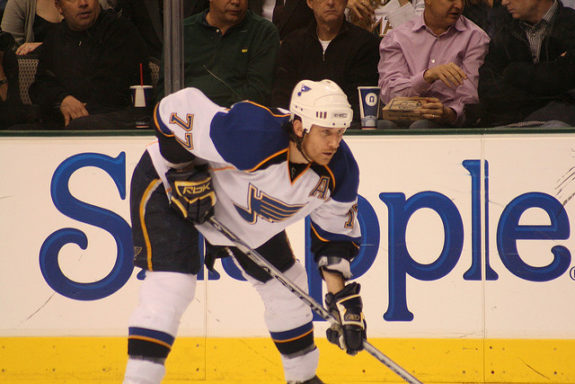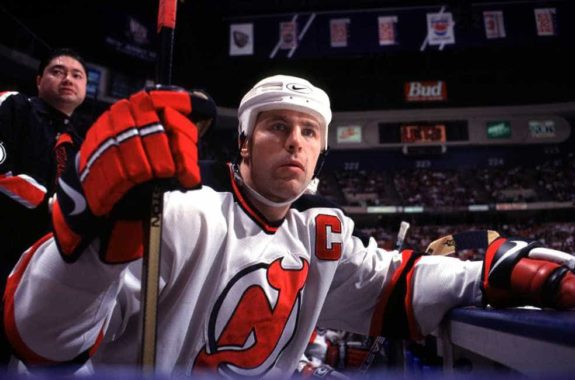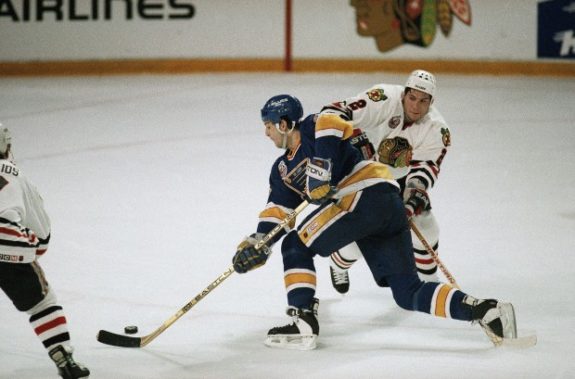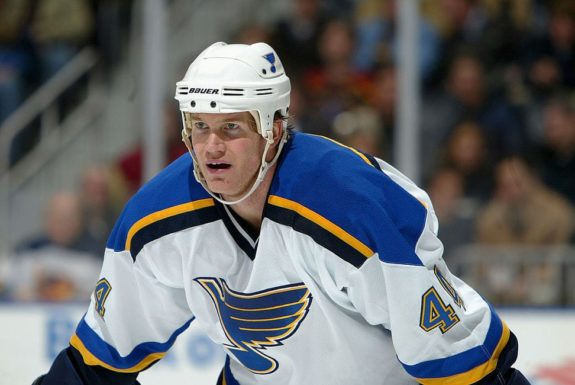The free agency period is a pivotal time for every NHL franchise, where teams can go from pretenders to contenders all in a matter of minutes. Over time, the NHL has seen its fair share of offseason blockbuster signings, trades, and releases that send a ripple effect throughout the entire league.
Although this can be a time to bolster your roster and add depth to a team that might be a few pieces away from competing for the coveted Stanley Cup, it can also lead to disastrous experiments that could only have been prevented in hindsight. When analyzing the offseason moves of the St. Louis Blues over the course of the organization’s 54-year history, three notable offseason signings left the Blues with a deep sense of regret and frustration.
These signings failed for a number of different reasons, but regardless, they hurt the Blues both in the short-term as well as long-term trajectories of their club. Here are the three worst free-agent signings in Blues history.
Paul Kariya
When you sign an elite-level talent, the assumption is they are going to elevate your club’s game to a new level. This was the thought process when the Blues signed 2017 Hall of Fame inductee Paul Kariya to a three-year deal worth $18 million in the 2007 offseason.
Kariya was coming off of a strong regular season campaign the previous year with the Nashville Predators, rattling off 76 points while playing in all 82 regular-season games. In his first season with the Blues, he was a serviceable member of the roster, registering 65 points and once again proving his iron man status by playing all 82 regular-season games for the fifth time in his career.
While Kariya may have found some individual success, the Blues finished in the bottom-five of the league standings, not exactly the start to the “Kariya Era” Blues fans had hoped for. Entering into the 2008-09 season, expectations for the Blues began to rise, but unfortunately, this would not be the case.
Coming out to a blistering hot start to the season, Kariya had scored 15 points in 11 games played, a league-leading pace. Although this was pointing towards a resurgent season for the all-time great, after taking a hit from behind while facing his former team the, Anaheim Ducks, he would suffer from torn hip ligaments in his upper thigh early on into the season, sidelining him for the remainder of the year.

After returning to the ice in the 2009-10 season, Kariya continued his solid play. With his veteran presence and polished skillset, even at age 36, he continued to impact the game. Although, as was an unfortunate trend in his professional hockey career, after receiving an elbow to the head in a contest against the Buffalo Sabres in mid-December, Kariya would be diagnosed with his sixth concussion.
Somehow, Kariya would finish the 2009-10 season in what would become the final season of his career. After suffering a plethora of major injuries during his career, with the severity of the damage done via concussions, including a particularly disturbing hit suffered at the hands of fellow Hall of Fame inductee Scott Stevens, Kariya was forced to hang up his skates for good.
After heeding the advice of medical professionals and retiring in the 2010 offseason, it is clear to see that while his time with the Blues may not have lived up to the hype, after a long history of head trauma and other injuries, Kariya’s tenure with the Blues is more of a mixture of bad circumstances, rather than poor performance.
Expectations may not have been met for this signing, as the hefty price tag hindered the Blues over the duration of those three seasons. The Kariya experiment may have failed, but this can be chalked up to unfortunate circumstances, as his output was fantastic when he was able to stay healthy.
Jay McKee
In one of the organization’s biggest head-scratchers, the Blues signing of Jay McKee in 2006 was, to be blunt, a trainwreck. Signing on the opening day of free agency, McKee and the Blues agreed to a four-year deal worth $16 million.
The now-head coach of the Hamilton Bulldogs in the OHL, McKee spent the first eight years of his NHL career as a member of the Sabres as a shutdown, stay-at-home defenceman. Heading into the 2006 offseason, the expectation was he’d re-sign with his long-time team, but the Blues would enter with an offer he couldn’t refuse.
Coming in with an offer that far exceeded the expected asking price for McKee’s services, the Blues landed the then-29-year-old blueliner to help the rebuilding squad in their efforts to get back into the win column. With a large contract on the table, many questioned the signing from the get-go, and they would be proved right for this observation.

Making his debut season with the Blues, McKee exemplified a letdown year. Playing in only 23 games that season, he was unable to register his name on the scoresheet even once before shutting it down for the season after a multitude of injuries began to pile up.
McKee’s second season with the Blues was an improvement, but not by much. Managing to score nine points in 66 games played, it was clear he was not going to be able to play to the level expected based on the big deal he had signed two years prior. As the Blues continued to struggle as a unit, the playoffs continued to seem like a pipe dream at best.
After his third season with the Blues, McKee’s numbers somehow got worse. He put up fewer points while appearing in three more games than the year prior. While the Blues began to come into their own, making the playoffs for the first time in four seasons, this was in no part due to the efforts of McKee.
With his porous play on the ice, mixed with a contract that was causing a stall in the Blues’ ability to acquire much-needed talent for the future, McKee was bought out of his contract with one year left remaining on the deal. After his release, McKee signed with the Pittsburgh Penguins on a one-year deal, the last contract he would sign in the NHL.
To say the McKee signing was a mistake is an understatement. Tying up that much money to a player who was more of a boost to a roster rather than a core player the Blues could build around did not make sense for a team in a rebuilding situation. Because of this, the Blues would battle within mediocrity for several seasons, not having much more success than a first-round exit until the 2012 playoffs.
While it may have been a bad signing, this cannot be held against McKee. His play certainly did not translate to his pay, but it was the Blues’ own poor decision-making that landed them in that situation to begin with. Shelling out the big bucks to a player never considered a star is a blemish on the record of Blues management and served as a long-lasting lesson when considering making big-time offers.
Scott Stevens
Nowadays, Scott Stevens is synonymous with the New Jersey Devils organization, but their union only came about after a string of whacky and unforeseen events.
After eight tremendous seasons with the Washington Capitals, Scott Stevens signed an offer sheet from the Blues in the 1990 offseason. As part of Stevens being a restricted free agent (RFA), the Capitals were compensated with two first-round picks, $100,000, and three conditional first-round picks, which would all wind up in the hands of the Capitals. After bringing in such an exuberant haul for Stevens, the Blues had gone all-in for their new star defenceman.

With the majority of their future gone due to one signing, the Blues were banking on Stevens continuing his dominant ways, but luckily for them, he delivered. Racking up 49 points in 78 games played, Stevens was a force on both ends of the ice for the Blues. After having such a fantastic season, the newly appointed captain of the Blues was thrilled with his current situation, and the Blues knew they had a championship opportunity in front of them.
In the 1991 offseason once again, the Blues would make a bold move by acquiring RFA Brendan Shanahan in a deal similar to how they had acquired Stevens the year prior. By the books, the signing was legal, but there was a glaring issue in the deal; the Blues had little to no assets that they were able to offer to Shanahan’s former team, the New Jersey Devils.
Reports indicated that the Blues had offered the Devils up-and-comer Rob Brind’Amour and goaltender Curtis Joseph in exchange for Shanahan, which looking back was quite a solid offer. The Devils were not satisfied with the offer, as they wanted greater compensation for one of the top scorers on their roster. The Devils reportedly countered the Blues’ offer by wanting Scott Stevens or Adam Oates as part of their compensation.
The two organizations butted heads over these deliberations until an arbitrator was brought in to settle the debate. As a result, the arbitrator ruled that as compensation for the Shanahan signing, the Blues must send the Devils Scott Stevens in return.

The move stunned the NHL world and left many considering what was going to come of this move. Stevens, who was happy with his role on the Blues, was unhappy with the decision and considered refusing to report to training camp in New Jersey.
Ultimately, Stevens would go on to solidify his Hall of Fame career with the Devils, captaining three Stanley Cup-winning teams in New Jersey, and retired as a member of the club in 2004 after spending 13 seasons with the team. Shanahan’s time in St. Louis, however, was not quite so glamorous.
While the Blues would still field a competitive team during his four-season tenure, they never came close to the successes had by the Stevens and the Devils. The Blues would eventually deal him to the Hartford Whalers in exchange for a young Chris Pronger, who would go on to be a fantastic talent within the Blues organization but would ultimately find his greatest successes elsewhere.
While it may be a convoluted and confusing tree to follow, the Blues essentially gave up five first-round picks for one season of Scott Stevens, all to trickle down into Chris Pronger, who was only able to lead the Blues past the second round of the Stanley Cup Playoffs once. This signing more or less cost the Blues their future and lead to an abundance of struggles to put together a strong team with virtually no other assets.

The Blues went high-risk but did not reap the rewards, instead falling flat and missing out on what could’ve been a dangerous team within the 1990s.